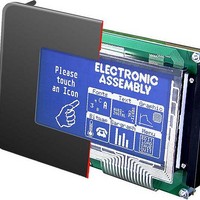EA KIT240-7LWTK ELECTRONIC ASSEMBLY, EA KIT240-7LWTK Datasheet - Page 6

EA KIT240-7LWTK
Manufacturer Part Number
EA KIT240-7LWTK
Description
LCD Graphic Display Modules & Accessories Blue/White Contrast RS-232 Snap-In Kit
Manufacturer
ELECTRONIC ASSEMBLY
Datasheet
1.EA_KIT240-7LWTK.pdf
(20 pages)
Specifications of EA KIT240-7LWTK
Pixel Density
240 x 128
Module Size (w X H X T)
144 mm x 104 mm x 39 mm
Viewing Area (w X H)
114 mm x 64 mm
Backlighting
LED
Background Color
Blue, White
Attached Touch Screen
No
Product
Graphic LCD Module
Style
LCD Graphic Display
Interface
RS-232
Lead Free Status / RoHS Status
Lead free / RoHS Compliant
EA KIT240-7
MACRO PROGRAMMING
Single or multiple command sequences can be grouped together in macros and stored in the
EEPROM. You can then start them by using the Run macro commands. There are 3 different types
of macros:
Touch macros (1..255)
These are started when you touch a touch field (in versions with a touch panel - TP) or when you
operate an external key/matrix keyboard. Touch macro no. 0 is different: It is started when you release
a key.
Port macros (0..255)
These are started when voltage is applied to IN 1..8 (only in versions with EA OPT-OPTO8I8O inputs
and outputs).
Normal macros (1..255)
These are started by means of a command via the serial interface or from another macro. A series of
macros occurring one after the other can be called cyclically (movie, hourglass, multi-page help text).
Power-on macro
Normal macro no. 0 is different: It is executed automatically after power-on. It allows you to switch off
the cursor and define an opening screen, for example.
STORING 256 IMAGES IN THE EEPROM
To reduce the transmission times of the serial interface or to save storage space in the processor
system, up to 256 images can be stored in the internal EEPROM. They can be called using the "ESC
U E" command via the serial interface or from within a touch/port/normal macro. All the images can
be used in the Windows BMP format. They can be created and edit using widely available software
such as Windows Paint or Photoshop.
CREATING INDIVIDUAL MACROS
To create your own macros, you need the following:
- The EA DISK240
- A PC with a COM1 or COM2 serial interface and approximately 500KB hard disk space
- A text editor such as WordPad or Norton Editor
To define a sequence of commands as a macro, all the commands are written to a file on the PC (e.g.
DEMO.KMC). You specify which character sets are to be integrated and which command sequences
are to be in which macros.
Once the macros are defined, you start the
program C:>KITCOMP DEMO.KMC. This
creates an EEPROM file called DEMO.EEP,
which is then automatically stored in the
display EEPROM with the baud rate entered.
This only takes a few seconds, and you can
then use your user-defined macros
immediately. You will find a detailed
description of how to program macros,
together with a large number of examples, in
the files DOKU.DOC (for WORD) and
DOKU.TXT (DOS) on the EA DISK240
floppy disk.
6
*)
floppy disk, which contains a compiler, examples and fonts
*)
*)
Also on the Internet: http://www.lcd-module.de/deu/disk/disk240.zip
;Macro demo
COM2: 115200
;----------------------------------------------------------
;Define constants
AUS = 0
EIN = 1
FONT4x6 = 1
FONT5x6 = 2
FONT6x8 = 3
FONT8x8 = 4
FONT8x16= 5
;----------------------------------------------------------
;Include fonts
Font: FONT4x6, 32, 95 INTERN4x6
Font: FONT5x6, 32,158 INTERN5x6
Font: FONT6x8, 32,158 INTERN6x8
Font: FONT8x8, 32,158 INTERN8x8
Font: FONT8x16, 32,158 INTERN8x16
;----------------------------------------------------------
Macro: 0
#QC EIN
#FT FONT8x16
#UL 0,20,<EA2.BMP>
; KIT is connected to COM2
; Transmission at 115,200 baud
; Power-on/reset macro
; Cursor visible
; Set terminal font
; ELECTRONIC ASSEMBLY logo
















